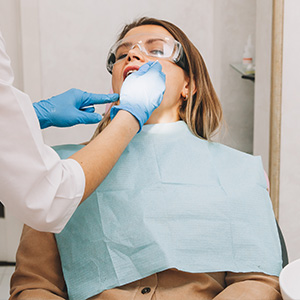Tooth Extractions & Wisdom Teeth
While we always try to save your natural tooth, when an extraction is necessary, our goal is to make the procedure as comfortable as possible.



Keeping smiles healthy and pain-free
At Kits Family Dental, our dentists always try to save your natural teeth. There are times, however, when removing a severely decayed, damaged, or impacted tooth is the best way to protect your oral health.
Whether it’s a simple tooth extraction or the surgical removal of wisdom teeth, our team offers top-notch care for kids, teens, and adults. We use the latest, evidence-based techniques to make treatment stress-free.
If your tooth is causing pain, you’ll be happy to know that the pain will stop as soon as the tooth is removed.
Extracting an infected, damaged, or impacted tooth prevents the domino effect of issues that can occur if not treated.
Tooth extractions are sometimes the first step in orthodontic treatment or getting a dental implant.
What to expect with a tooth extraction or wisdom teeth removal

Our dentists will make an accurate diagnosis to determine if an extraction is necessary. If it is, we may take additional images to map out the positioning of your tooth roots and evaluate your bone conditions. The dentist will explain what to expect before, during, and after the procedure, as well as answer any questions you have.

The dentist will numb the area with a local anesthetic. Once you’re numb and relaxed, the dentist will use specialized tools to carefully detach the tooth from the socket and remove it from your mouth.

When the tooth is removed, the dentist will clean the area. Depending on the case, they may close the extraction site with dissolvable stitches. You’ll receive post-operative instructions to follow to promote optimal healing.
When are extractions necessary?
Common reasons for a tooth extraction include:
- Severe damage or decay
- An abscess or infection
- Overcrowding
- Impaction
- Wisdom teeth causing complications
Do tooth extractions hurt?
The dentist will inject a local anesthetic to ensure you don’t feel anything aside from some pressure during the extraction.
Can you perform tooth extractions on kids?
Yes. We offer tooth extractions for kids. Our experts are pros at putting little ones at ease.
What is tooth extraction/wisdom teeth removal recovery like?
The recovery depends on the tooth extracted and the reason for the extraction. Your Kistsliano dentist will provide detailed post-operative instructions for you to follow.
Right after the extraction, the dentist will cover the socket with sterile gauze. They’ll have you bite down on it to control any bleeding.
Once the anesthetic wears off, you may have discomfort and swelling. Holding ice on your cheek in the extraction area, sticking with a soft foods diet, and taking a prescribed or over-the-counter pain reliever will help.
If you were prescribed antibiotics, take them as instructed. You’ll also likely have to avoid drinking from a straw, smoking, and vaping during the healing process, so you don’t interfere with clot formation.
You’ll be pain-free and back to eating your regular diet in a few days.
At what age should I have my wisdom teeth taken out?
Not everyone gets wisdom teeth and, for those who do, the teeth don’t always need to be removed. However, if the wisdom teeth can’t erupt properly, extracting them in the teenage years before their root structure is fully formed will make the procedure and recovery much easier.
We generally recommend patients have their wisdom teeth evaluated at the first sign of complications or when they’re a teenager.
Do wisdom teeth always need to be removed?
Not at all! If your wisdom teeth fully erupt, the gums and teeth are healthy, and there aren’t alignment issues, extraction isn’t necessary.
When is wisdom tooth removal recommended?
Your dentist may recommend having your wisdom teeth removed if:
- The teeth are partially or fully impacted
- They’re infected or likely to cause an infection
- A cyst has formed around the unerupted teeth
- They’re coming in crooked and will interfere with your bite or damage adjacent teeth
- You don’t have enough room in your jaw to accommodate the teeth
- They’re too difficult to clean and put you at risk for tooth decay

